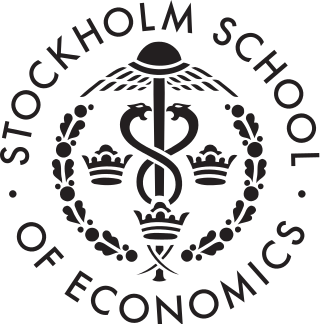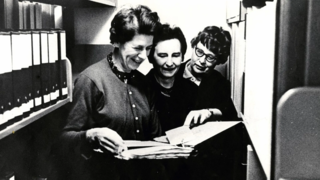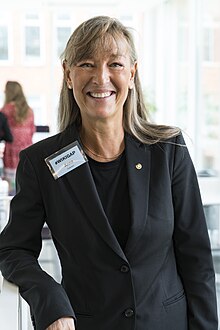
Chalmers University of Technology is a private research university located in Gothenburg, Sweden. Chalmers focuses on engineering and science, but more broadly it also conducts research and offers education in shipping, architecture and management. The university has approximately 3100 employees and 10,000 students.

The University of Gothenburg is a university in Sweden's second largest city, Gothenburg. Founded in 1891, the university is the third-oldest of the current Swedish universities and, with 53,624 students and 6,707 staff members, it is one of the largest universities in the Nordic countries.

The Stockholm School of Economics is a private business school located in city district Vasastaden in the central part of Stockholm, Sweden. SSE offers BSc, MSc and MBA programs, along with PhD- and Executive education programs.

The Umeå School of Business, Economics and Statistics, USBE, or Handelshögskolan vid Umeå Universitet, is the business school of Umeå University in the north of Sweden, founded in 1989 "to strengthen education in research and business while contributing to the community". About 2000 students currently study at USBE. The School offers one Bachelor program, four undergraduate programs (Civilekonomprogram), seven Master's degree programs and doctoral programs.

Agnes Wold, born January 7, 1955, is a professor of clinical bacteriology specializing in the normal flora of the body, at the Sahlgrenska Academy at the University of Gothenburg, Gothenburg, Sweden. She is a nationally known commentator on television, radio and in newspapers on issues related to infectious disease and women in science.
Håkan Håkansson is a Swedish organizational theorist, and Professor of International Management at the BI Norwegian Business School, known for his work on business networks.
David Ford is a British organizational theorist, Professor Emeritus at the University of Bath School of Management, and co-founder of the International Marketing and Purchasing Group in the mid 1970s. He is known for his work with Håkan Håkansson on business networks.
Ivan Snehota (1946–2022) was an Italian organizational theorist, consultant, and Professor of Marketing at the Faculty of Communication Sciences of the University of Lugano, known for his work in the field of business networks with Håkan Håkansson and others.
The Industrial Marketing and Purchasing Group or International Marketing and Purchasing Group is a European research initiative in the field of Industrial marketing established in 1976 by researchers from different countries and universities in Europe. It has evolved into an "informal international group of scholars concerned with developing concepts and knowledge in the field of business-to-business marketing and purchasing", and is also concerned with marketing and purchasing in a business-to-consumer context. The group is also called the Nordic school of marketing.
Lars-Erik Gadde is a Swedish organizational theorist and Professor of Technology Management and Economics at Chalmers University of Technology in Gothenburg, Sweden. He is known for his work on business networks, professional purchasing. and case study research.
Alexandra Waluszewski is a Swedish organizational theorist, Professor at the Department of Economic History of the Uppsala University, particularly known for her work with Håkan Håkansson on "Managing Technological Development" and "Knowledge and innovation in business and industry."

Krister Holmberg, born 1946, is a Swedish chemist.

Sofia Börjesson is a Swedish Professor (chair) in Technology Management Department at Chalmers University of Technology in Gothenburg Sweden. Her academic research field evolves around questions of how large, mature organizations change and develop, with focus on the management of innovation work. She works on applying innovation as an organizational transformation and in particular in a context of business model innovation. She applies qualitative methods, often collaborative research methods, cooperating with industrial partners with the intent to create actionable knowledge. She has published her work in journals such as R&D Management, Journal of Change Management, Int. J. Operations and Production Management, Technovation and Creativity and Innovation Management.

Lisbeth Olsson is a Swedish microbiologist and a professor in industrial biotechnology at Chalmers University of Technology in Gothenburg.

Kirsten Kraiberg Knudsen is a professor of astrophysics in the department of Space, Earth and Environment at Chalmers University of Technology. Her research concerns galaxy formation and evolution.

Asta Ekenvall was a Swedish librarian, one of the founders of the Kvinnohistorisk arkiv of the University of Gothenburg and a pioneer in research and philosophy of women's history.
Maria Falkenberg is a professor of medical biochemistry at the Sahlgrenska Academy of the University of Gothenburg, Sweden. She has made important contributions to understanding how the mitochondrial genome is maintained in health and disease.

Agnes Birgitta Odén-Dunér was a Swedish historian. She was the first woman to hold a professorship at Lund University, and was also the first female history professor in Sweden. She was a member of several local and international literal and historical academies such as the Finnish Society of Sciences and Letters; The Science Society in Lund (honorary); the Royal Swedish Academy of Letters, History and Antiquities; the Academy of Finland; the Norwegian Academy of Science and Letters from 1977; and the Academia Europaea.

Alf Erik Holger Crafoord was a Swedish industrialist and patron. He founded Gambro, which developed and commercialised the artificial kidney. He also established the Crafoord Foundation, the proceeds of which fund the Crafoord Prize for scientific research.

Vivi Sylwan was a Swedish textile historian and textile curator at the Röhsska Museum in Gothenburg.













